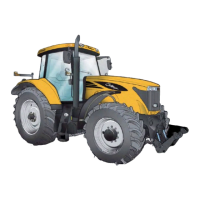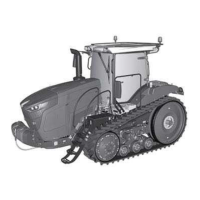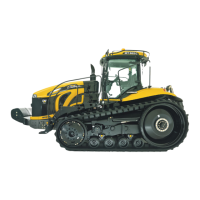Do you have a question about the Challenger Techstar CVT MT545B and is the answer not in the manual?
Information about identifying the tractor through various serial numbers like registration plate, engine, and cab.
Guidance to the user on understanding and using the operator instruction book for effective tractor operation and maintenance.
Information regarding the operator instruction book, including its availability and the manufacturer's right to modify it.
Details on warranty terms and conditions, including the buyer's responsibility for inspections and transport.
Emphasizes driver safety as a primary concern in tractor design and operation, advising careful reading of safety instructions.
Explains the meaning and usage of safety alert symbols and terms to highlight risks of personal injury or death.
Defines danger, warning, and caution signals and their implications for personal safety, as well as important notes and procedures.
Outlines essential safety procedures for proper tractor operation, including operator qualifications and following instructions.
Discusses protection aspects, including the ROPS cab, seat belts, and the importance of not repairing damaged ROPS cabs.
Details essential steps and checks before operating the tractor safely, including knowing the equipment and protecting oneself.
Provides comprehensive guidance on safe working practices, covering general operation, bystander safety, and risks like overturning.
Covers crucial safety steps to be taken after finishing tractor operation, including stopping the engine and securing the tractor.
Illustrates and explains the meaning and location of various safety decals on the tractor.
Details the components of the tractor's instrument panel, including switches, controls, and displays.
Explains the various control indicator lights for functions in use and failure/parking brake signals.
Describes the control screen that allows monitoring of various parameter displays and selection of information.
Details the DOT MATRIX screen, which displays various parameters, menus, and control functions for the tractor.
Explains the function and operation of the clutch, brake pedals, and foot throttle on the tractor.
Details the various controls and levers located on the right-hand console of the tractor.
Describes the controls and features located on the left-hand console, including electrical controls and mirrors.
Provides a detailed description of the tractor seat, including its adjustment features for comfort and safety.
Explains the adjustment features for the steering wheel, including angle and height adjustments for optimal operator positioning.
Details the controls and features located on the upper console, including interior lighting, ventilation, and air conditioning.
Outlines precautions and procedures for the initial running-in period of the tractor to ensure engine and component longevity.
Details the correct procedures for starting the tractor engine, including cold weather starting and safety precautions.
Explains the correct procedure for stopping the tractor engine, emphasizing precautions for turbocharger engines.
Provides guidance on driving the tractor, including the use of foot throttle, gear selection, and PowerShuttle control.
Explains the operation of the "TECHstar CVT" transmission, including control modes, ground speed, and speed regulators.
Details the operation and modes of the front axle 4WD engagement system, emphasizing its use for field work.
Explains the function and operation of the rear axle differential lock, its importance in preventing wheel slip during field work.
Describes the control and engagement procedure for the front power take-off (PTO).
Details how to select PTO speeds and engage the rear power take-off (PTO) for various implements.
Explains the operation of the electronic linkage system for attaching and controlling implements, including depth and height settings.
Describes the tractor's hydrostatic power steering system and its operation, including manual operation when the engine stops.
Details the auxiliary hydraulics system, including flow control valves, hose connections, and types of controls available.
Outlines the essential inspection tasks to be performed during the initial 50-hour service of the tractor.
Provides a comprehensive service guide detailing maintenance tasks and their recommended visit intervals (50h, 400h, etc.).
Offers user-specific guidance on maintenance checks for engine, electrical systems, front axle, transmission, and clutch.
Recommends specific lubricants and provides guidelines for lubrication throughout the year.
Details specific lubrication points on the tractor and the corresponding servicing schedule.
Covers essential engine maintenance tasks, including oil level checks, oil and filter changes, and breather cleaning.
Details maintenance procedures for the fuel system, including prefilter, filter replacement, bleeding, and fuel tank draining.
Explains the procedure for cleaning and replacing the air filter elements, including prefilters and main filters.
Provides instructions for checking coolant level, quality, and maintaining the cooling system, including radiator fins and fan belt.
Covers maintenance for steering, transmission, auxiliary hydraulics, and their respective filters and oil levels.
Details maintenance procedures for the front axle, final drive units, and 4-wheel drive system, including oil level checks and changes.
Outlines checks for the clutch liquid level and brake systems, including bleeding procedures.
Explains maintenance tasks for the air conditioning system, including condenser cleaning and receiver drier replacement.
Guides on checking the fan belt's condition and tension, and procedures for replacing trapezoid and Poly V belts.
Covers maintenance of the tractor cab, including air filter cleaning, cab suspension, and ROPS cab/frame bolt tightness.
Provides information on tyre usage, dual rear wheels, wheel bolts, and inflation pressure for optimal performance.
Details how to adjust the front and rear wheel tracks for optimal tractor alignment and stability.
Covers checks for batteries, alternator, trailer socket, and headlight adjustments.
Provides a guide to replacing fuses in the tractor's electrical system, including a fuse chart.
Offers guidance on proper fuel handling, storage conditions, and recommended fuel specifications for optimal engine performance.
Provides detailed specifications for the tractor's engine, including bore, stroke, cubic capacity, and power ratings.
Details the ground speed ranges for the "TECHstar CVT" transmission in forward and reverse, Tortoise and Hare modes.
Lists specifications for the tractor's electrical system, including voltage, batteries, alternator, and lighting components.
Provides specifications for the tractor's cooling system, including operating mode, fan, belt, and radiator details.
Details the specifications of the tractor's gearbox, including continuous hydrostatic and mechanical variation capabilities.
Provides specifications for the tractor's final drive units, including their location and reduction ratios for various models.
Details specifications for the rear PTO, including flanged shaft options and control methods.
Outlines specifications for the front axle 4WD system, including clutch mechanism and differential lock type.
Provides specifications for the rear and front linkage systems, including types, lifting force, and capacities.
Details specifications for the tractor's brake system, including type, diameter, control, and number of discs.
Describes the steering system specifications, including type, turning radius, and track adjustments.
Details specifications for the tractor's wheels, including front drive type and rear adjustment options.
Lists compatible front and rear tyre sizes for 4-wheel drive tractors, emphasizing the importance of correct choices.
Refers to Chapter 5 for information on proper tyre inflation pressures, crucial for performance and safety.
Refers to Chapter 5 for instructions on adjusting the tractor's track widths.
Provides noise level measurements (dBA) at the operator's ears for windows closed and open, measured according to ECE directives.
Lists the capacities of various tractor fluid systems, including fuel tank, cooling system, engine sump, and hydraulics.
Provides critical tightening torque values for wheels and miscellaneous components to ensure proper assembly and safety.
Lists the key dimensions and weights of the tractor, including wheel base, overall length, and ground clearance.
Provides detailed specifications for dimensions and attachment points for specific tractor models.
Offers detailed specifications for dimensions and attachment points for specific tractor models.
Lists various available accessories and options for the tractor, including wheel weights, linkages, and comfort features.
Explains the functions and operation of the "DATATRONIC" onboard computer, including data reading and function selection.
Details the "DUAL CONTROL" system for semi-mounted ploughs, covering general operation, adjustment, and furrow start/end settings.
Explains the "FRONT DUAL CONTROL" system for front implements, covering its operation, adjustment, and calibration.
Describes the TIC system for trailed implements, including its sensors, operation, and adjustment screens.
Details the "DATATRONIC 3" onboard computer, its general functions, data display, and access keys for applications.
Explains how to use the MEMORIES application to store parameters for different implements, including saving names and sequences.
Guides the user on how to use the WORK application to display stored tractor parameters and select functions.
Covers the SETTINGS application for configuring tractor parameters such as time, units, screen settings, and servicing schedule.
Details the HEADLAND application for automating maneuvers at field ends, including recording and reading sequences.
Explains how to set hydraulic spool valve parameters, including flow rates, activation times, and floating positions.
Describes the DUAL CONTROL system for managing front and rear implements simultaneously, including calibration and operation.
Explains the TIC system for trailed implements, covering its operation, sensors, and parameter settings like furrow start and end lengths.
Covers the use, operation, and hitching of the front linkage system, including safety instructions and external controls.
Details the power level allowed for the front PTO and the procedure for controlling its engagement and brake.
Addresses common engine problems such as failure to start, lack of power, overheating, and misfiring, providing diagnostic steps.
Details common hydraulic circuit issues like ram problems, lift arm failures, pump issues, and oil leaks, offering diagnostic solutions.
| Engine Type | Diesel |
|---|---|
| Engine Power | 45 HP |
| No. of Gears | 8 Forward + 2 Reverse |
| PTO HP | 38 HP |
| PTO Speed | 540 RPM |
| Brake Type | Oil Immersed |


